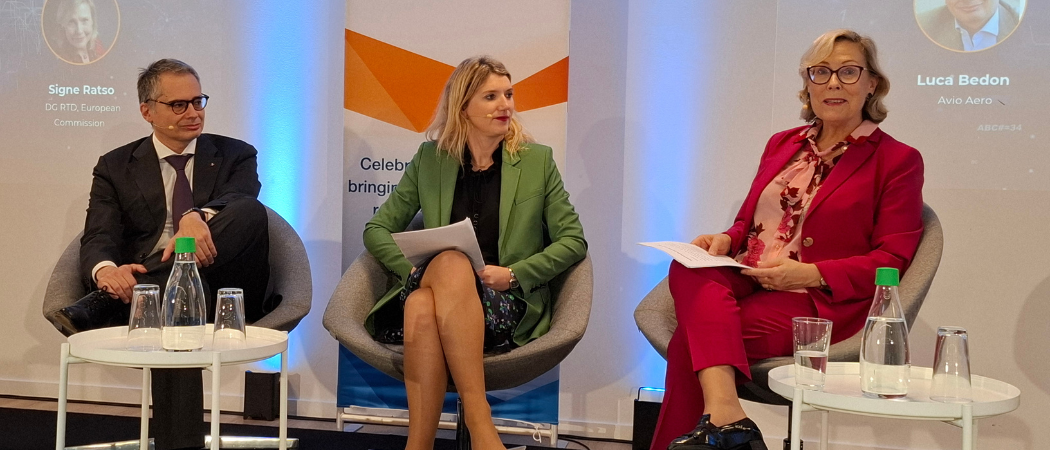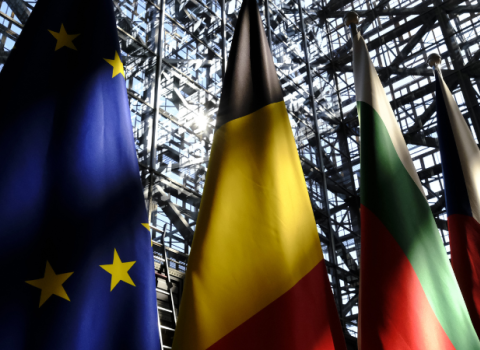Just as new countries join the EU research programme, it’s being radically reorganised

Signe Ratso (right), Commission’s chief negotiator for association deals, speaking at a Science|Business event with European Investment Bank's Catherine Bender (centre) and Luca Bedon, head of R&T at Avio Aero. Photo credits: Jeroen Vanhecke / Science|Business
Brussels is preparing to radically overhaul its research and innovation programmes and there’s some concern that non-EU associated countries could be shut out by the proposed changes.
Last week, a group of experts led by former Portuguese science minister Manuel Heitor recommended sweeping changes in Framework Programme 10 (FP10), due to start in 2028.
These include allowing dual use research in the programme, an option already put on the table by the European Commission earlier this year, as the EU tries to ratchet up its military R&D in the face of an aggressive Russia.
But a more military focus for FP10 could cause problems for associated countries outside the EU, like the UK, Canada or South Korea, because sensitive defence-related research might end up being confined to the bloc.
The Commission’s chief negotiator for association deals, Signe Ratso, sounded a warning last week at a Science|Business event, saying, “The question would be then whether we could open the whole programme.”
Including dual use “raises a lot of questions,” she added. “Our programme has really become global. We’ve opened it up for countries like Canada, New Zealand, South Korea, Japan, and this certainly makes our programme more attractive […] the question would be, what kind of implications it would have [including dual use calls],” Ratso said.
So far, Ratso has struck deals with New Zealand, Canada and South Korea to associate to part of the existing programme, Horizon Europe, meaning their researchers can apply on equal terms with Europeans. Singapore and Japan are also at the negotiating table.
Longstanding neighbouring partners, the UK, Israel and Norway are also associated, while Switzerland is expected to seal an association deal this year after a wider dispute with Brussels stopped it from associating to Horizon Europe when it began in 2021.
In other words, as Ratso says, Horizon Europe has almost become the world’s research programme, with scientists from Seoul to Wellington now working out how to join.
But at the same time, an anxious EU is remoulding the research programme to de-emphasise global challenges in favour of European defence and industrial might.
The risk is that this puts the brakes on how international FP10 can be, although not all associated countries see the shift as a problem, and welcome many of Heitor’s ideas.
Possible defence exclusions
One risk is that a more defence-focused programme prompts Brussels to impose more restrictions on who can join certain research projects.
The EU already has the power to exclude non member state countries from certain sensitive calls, as Ratso pointed out last week. Brussels has previously used this power to keep the UK and Israel out of certain quantum and space projects, respectively.
In addition, national export controls on defence-related technology could complicate collaboration outside the bloc, making EU researchers more reluctant to partner with colleagues in Canada or South Korea, say.
Some associated countries have pushed back against mixing defence-related research throughout FP10. In a position paper earlier this year, the Swiss government said it “supports a separation between funding for defence and civilian research in FP10”.
The Swiss National Science Foundation has also demanded that FP10 remain purely civilian, as mixing in military research risks “additional administrative burden due to security concerns.”
The UK, which is trying to recover its successful position in Horizon Europe after a three year Brexit-related absence, has also stressed that FP10 should allow “the equal participation of likeminded associated countries in all areas of the programme from its very inception”.
Aside from this issue of dual use, the UK is also worried about repeated calls for a much bigger FP10 budget – also made in Heitor’s report - as this could make association unaffordable.
“In a world of constrained resources third countries will then, of course, need to consider the affordability of association to the next Framework Programme,” the country’s position paper, released last month, cautions.
South Korea is also watching closely to see if dual use research in FP10 could limit Korean involvement, said Yale Song, a network and policy officer at the Korea-EU Research Centre in Brussels.
But, he said, the Heitor report merely seemed to be stressing that dual use research shouldn’t be excluded from FP10 or distinguished by research calls, because dual use technology is now so ubiquitous.
“It assures us that third (or associated) countries such as Korea can still participate in EU research whether or not the research is potentially dual-use,” he said.
A ‘big mess’
Apart from this concern around dual use, there’s the fact that the Heitor report is proposing a radical rejig of the programme just as Kiwi, Canadian and South Korean researchers are trying to navigate a whole new world of EU grant bureaucracy.
For these far-flung newcomers, the problem could be particularly acute. Unlike neighbours such as the UK, Switzerland, Norway and Israel, they are only associated to Pillar II of the programme, which supports academic and industrial consortia, rather than the European Research Council (ERC) or European Innovation Council (EIC).
But Pillar II is now the part of Horizon Europe whose fate is most uncertain. One science diplomat from an associated country, speaking anonymously, called the future of Pillar II a “big mess”.
Heitor’s report fully backs the ERC and EIC, arguing for big budget increases.
But it wants big changes to Pillar II, and recommends a new, independent Industrial Competitiveness and Technology Council take charge, for example.
Support for ideas
Indeed, the UK has called for “evolution” rather than “revolution” in FP10. Having said this, associated countries aren’t publicly sounding the alarm, and in fact quite like plenty of the suggestions in Heitor’s report.
Asked whether he was concerned about policy churn in FP10, Peter Kyle, the UK’s secretary of state for science, innovation and technology, said he was “open minded about how we move forward.”
Iain Cossar, New Zealand’s general manager for science, innovation and international policy at the country’s Ministry of Business, Innovation and Employment, said that there were plenty of ideas in the Heitor report he liked.
These included the emphasis on better moving research into real world innovation, which dovetailed with New Zealand’s own policy.
Korea’s Song was also upbeat about the proposed changes, like a bigger budget and simplification of grant applications.





 A unique international forum for public research organisations and companies to connect their external engagement with strategic interests around their R&D system.
A unique international forum for public research organisations and companies to connect their external engagement with strategic interests around their R&D system.